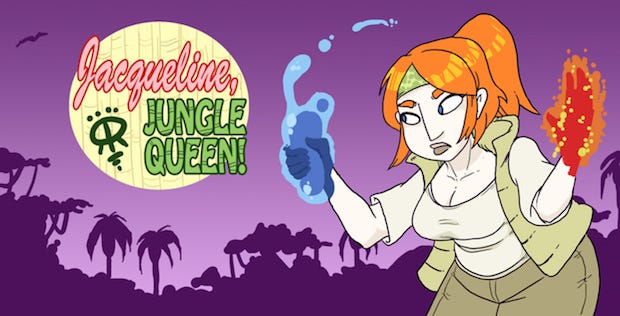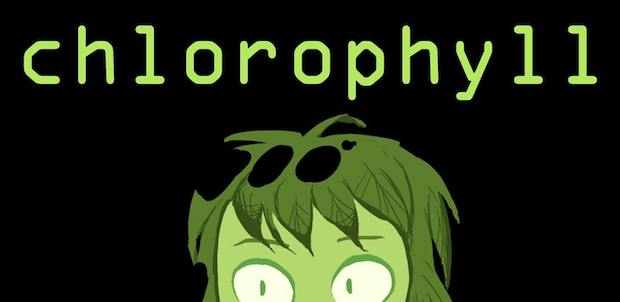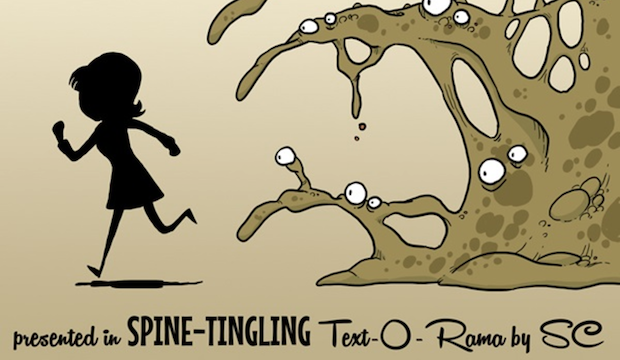IF Only: The Works of Steph Cherrywell
Four illustrated IF games
Steph Cherrywell is the creator of web comics (not necessarily safe for work) and graphic novels, such as Pepper Penwell and the Land Creature of Monster Lake. She is also one of the standout creators of comedy parser IF from the past couple of years, carrying over into interactive fiction her skill as an illustrator and her taste for riffing on naive adventure stories.
In Jacqueline, Jungle Queen (parser, Quest 5), the eponymous heroine is a spunky reporter who winds up stranded in the jungle and needing to explore her way to freedom. It's available to play online. The online version offers a self-updating map, a permanent inventory list, and some other nice goodies. Just be aware that the website times out if you leave it alone for too long, so don't expect to leave the game half-finished in a tab and come back the next day.
This was the first Cherrywell piece I played, and the opening had me a bit concerned that it was going to be replicating a number of tropes about "the dark continent" that deserve consigning to the dustbin of history.
Fortunately, this aspect recedes during the main portion of the game. The puzzles center on the heroine's ability (gained within the first few moves) to mimic animals she sees, making this into a contest of skill-acquisition. The structure is pretty classic: a simple initial puzzle to prove that you understand what you're doing in this environment, then several parallel puzzle options, then ramping difficulty. Please enjoy the monkeys.
Her Chlorophyll (parser, Inform 7) lets you play as an alien plant girl, just on the verge of plant-girl puberty. You're accompanying your mother on a mission to an abandoned planetary station, but there's an accident and Mom is put out of commission, leaving you to navigate the deserted station on your own.
The plant-girl premise allows for some entertaining puzzles, since you need light as a source of sustenance. Several puzzles have multiple solutions in which you can decide whether you want to play the game as a more obedient or a more subversive character. It's all fun, solid parser-game design tied together with a bit of protagonist self-definition. Cherrywell is not the first to experiment with giving the player multiple solutions where different routes are personality-defining — Daniel Freas' 2003 Erudition Chamber makes the entire game into a personality test on this basis, in fact — but the framing in Chlorophyll makes this a significant part of the narrative without completely overwhelming the player.
And around the puzzles, there's also a gentle narrative about whether you want to model yourself after your mother or not, and about how she sees you. Do you adopt her hairstyle? Does she consider you an adult yet? How do you feel about those masculine plants that have roots and stay in one place?
Brain Guzzlers from Beyond! (parser, Inform 7; winner of IF Comp 2015) is an interactive B-movie. The protagonist is the spunky Bonnie Noodleman, American teenager; her 1950s town of Canyonville is attacked by aliens that suck the brains out of any humans they encounter. Brain Guzzlers is the most ambitious of Cherrywell's work: the storyline is more complex and the puzzles are a little more challenging (though still on the gentle end of the spectrum for parser IF).
Cherrywell also makes a skillful blend of parser and choice-based features here. For most of the game, you're wandering around in parser mode with the usual noun-verb interaction, but conversations are menu-based, with a choice of specific dialogue options. That much is pretty common in past IF work going back to Adam Cadre's early contributions. Cherrywell's spin on this, though, is to keep the most action-packed moments in menu mode. Being chased by aliens? Deciding whether to make out with a boy? Your actions are focused and constrained to a menu, and the narrative speeds up accordingly.
This method gets around one of the standard complaints about any kind of action sequence in parser IF, the fragility of its pacing. If the player can do whatever they like, then the odds are good that they'll sometimes pick a fruitless action — taking inventory in the middle of being pursued by zombies, examining a painting while someone is being murdered in front of them. IF authors have tried various strategies to get around that. Sometimes they put an action timer in place to punish the player for doing anything unnecessary, so that frivolous activity leads to death; but this can make these sequences unreasonably difficult, and dying too many times undercuts the tension of a sequence as well.
Then there are more extreme approaches. Øyvind Thorsby disliked the pacing effects of EXAMINE so much that he wrote a couple of games that got rid of it entirely, including Attack of the Yeti Robot Zombies, which you are supposed to play only once, in order to make sure you take its puzzles and pacing seriously. (I lost. I am not supposed to ever play again. The Yeti Robot Zombies defeated me.)
Cherrywell's approach of constraining the player's choices only during these critical moments is a pretty effective solution, and still gives the player a lot of freedom during the rest of the story.
Meanwhile, the narrative embeds some social commentary — on what's expected of women in this time and place; on the way different racial groups talk about one another; on the competing stereotypes of femininity.
Whitefield Academy of Witchcraft (parser, Quest 5) is Cherrywell's first public work, a riff on magic schools and Harry Potterism, together with a spell-collection mechanic. Whitefield Academy is also available to play online if you would prefer not to download for local play; the same caveats apply as with Jacqueline, Jungle Queen.
For all its debts in both mechanic and fiction, Whitefield Academy is very clearly marked as a story about growing up female. There's a hunger daemon and the protagonist is always on the lookout for things to eat, but her self-description shows her slightly overweight and conscious of the fact. The dormitory bathroom is matter-of-factly equipped with feminine hygiene products.
Despite chronology, I've put Whitefield last on this list because I think it's the most challenging entry point for new players of Steph's work: the puzzles are a bit less clued and the setting less polished. It's still, in my opinion, worth a run if you otherwise enjoy Steph's writing. And happily, if you do run into trouble, there's a first-rate walkthrough by David Welbourn, who has elevated interactive fiction walkthrough-writing to an artform in itself.
Reading all of Cherrywell's work together gives the sense of an author gaining both mastery of her craft and more subtlety around what she wants to say. Several characters in Whitefield Academy are direct precursors of characters in Brain Guzzlers. Jenny, Renee, and Mary Jane, as well as Traudl Brandt, all appear in both stories with similar personalities and circumstances, though in Brain Guzzlers they don't have any magical powers per se. Brain Guzzlers makes these characters more interactive and somewhat more nuanced, but also glosses over some things that Whitefield Academy explains directly: Jenny Yoshida's time in an internment camp, for instance. Then, too, Jenny and Mary Jane have a nascent romance in both stories.
Cherrywell consistently deploys the tropes of children's literature and adventure stories to talk about the types of people, situations, and relationships often left out of those stories. In the process, she also populates parser IF with a few more heroines.
Finally, if you like Cherrywell's work but you've already played all of it, you might enjoy Brian Uri!'s Augmented Fourth or Hunger Daemon by Sean M. Shore for the polished parser-IF humor. If you're interested in more riffs on young adult literature in IF, try Brendan Patrick Hennessy.
[Disclosures: Emily has not met Steph Cherrywell, though she did provide the prize Steph selected for IF Comp 2015. More generally, Emily is not a journalist by trade and works professionally with various interactive fiction publishers. You can find out more about her commercial affiliations at her website.]











